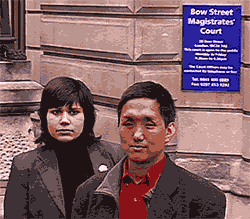Maya Anne Evans, Peace Protester, Risks Arrest Again
 Press Release
Press ReleaseFor immediate release
‘Maya Anne Evans, Peace Protester, Risks Arrest Again’
Contact: Maya Anne Evans 07973 484 202
Maya Anne Evans, 26, of Hastings, the first person to be convicted under the Serious Organised Crime and Police Act (SOCPA) for reading out the names of British soldiers killed in Iraq, and the author of a new book ‘Naming the Dead - A Serious Crime’, is risking arrest again on the anniversary of her first anti-war remembrance ceremony, breaking her conditional discharge just weeks before her appeal is heard in the High Court.
On Sunday 29 October, in Parliament Square, Maya will be reading out the names of British soldiers and Iraqi civilians who have died in the Iraq conflict in an unauthorised demonstration, once again risking arrest under SOCPA. She says: ‘I am willing to risk arrest at the “No More Fallujahs” protest on 29 October in order to help remember the massacre that happened in Fallujah in November 2004, when uncounted hundreds of women and children were killed by US forces with British support.’
Maya is also appealing her conviction under the Serious Organise Crime and Police Act. The appeal will be heard at the High Court on 16-17 November. If she loses her appeal, she will refuse to pay her fine of £300, risking a prison sentence. Last December, Maya was given a 12-month conditional discharge, requiring her to avoid arrest for the next 12 months, which she will be breaking by taking part in the unauthorised demonstration on 29 October.
Maya’s new book ‘Naming The Dead’ describes her path to radicalism in Blair’s Britain. It explains how the shock of the invasion of Afghanistan propelled her into becoming an anti-war activist; how time spent volunteering with the US nonviolent civil disobedience group Voices in the Wilderness made her commit herself more deeply to peace work; and how meeting a Hiroshima survivor on a peace walk inspired her to risk arrest for the first time at an anti-nuclear protest outside NATO Headquarters in Belgium just two months before her second ever arrest at the unauthorised ‘reading the names of the dead’ ceremony in Whitehall.
‘Naming The Dead’ also explains how Maya came to overcome her fear of public speaking in order to deal with speaking in court, and then the enormous media attention she faced after her conviction on 7 December 2006. This is the gripping story of how a young woman from Hastings came to defy an unjust law and an unjust war to stand up for what she believes in. The official publication date for ‘Naming The Dead’ is Saturday 18 November.
END
Note 1: On 25 October 2005, Maya stood near the Cenotaph reading the names of British soldiers who had died in Iraq, as part of an international anti-war campaign to mark the first anniversary of the Lancet Report (the Lancet recently published a new estimate of the death toll in Iraq putting it at 650,000).
Note 2. ‘Naming The Dead’ is published by JNV Publications
0845 458 9571 info@j-n-v.org.
For more information, please contact
Maya Anne Evans on 07973 484 202
or JNV on 0845 458 9571
--
Maya Evans
mayaevans@fastmail.co.uk




1 Comments:
More news on this issue:
Peers protest at curbs on protest
Body: Baroness Williams earlier led a Lib Dem protest outside Parliament calling for the end of restrictions on protests.
A controversial 2005 law created an "exclusion zone" around Parliament, within which police must be given notice before a protest is held.
Lib Dem peer Baroness Miller has brought forward a Bill to abolish the sections which impose the restrictions.
During the demo outside the House of Lords the peers read out names of people arrested under the Act.
The protest came as peers prepared to debate repealing parts of the Serious and Organised Crime and Police Act.
A Liberal Democrat spokesman confirmed they had registered with police to hold the demonstration.
"It comes to something when Parliamentarians can't even protest outside their own House without say so from the police," he said.
Loudspeakers
The requirement for police permission, introduced in the Serious Organised Crime and Police Act 2005, was the Government's and Parliament's response to a round-the-clock vigil in Parliament Square by anti-war protester Brian Haw.
Mr Haw's placards and his supporters' use of loudspeakers had annoyed MPs and peers.
But the law has since been used to arrest individuals for unauthorised peaceful demonstrations, such as Maya Evans reading out the names of Iraq war dead in Whitehall, or people wearing politically offensive tee-shirts.
Baroness Milller, introducing her Public Demonstrations (Repeals) Bill, said the 2005 Act had had a "chilling" effect on demonstrations, with many people believing they were totally banned.
She said: "Freedom to demonstrate outside Parliament is one of the most important freedoms of expression that Britain has.
"This government changed that fundamental freedom to a conditional one."
'Spontaneous'
Lady Miller said other laws already guarded against violent or disruptive protests.
"Now people are afraid they will get a criminal record for simply holding a placard or even wearing a tee-shirt in the environs of Parliament," she said.
The requirement for 24 hours' notice meant "spontaneous" protest was illegal, said Lady Miller.
She dismissed the counter-arguments of security, aesthetics and access to Parliament.
But her call for a change in the law was rebuffed by the government.
BBC
Post a Comment
<< Home